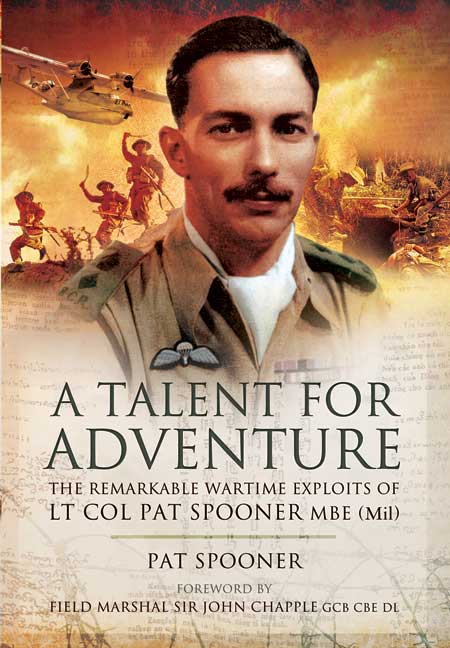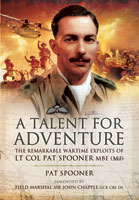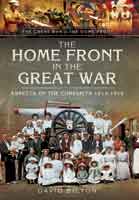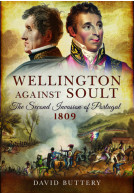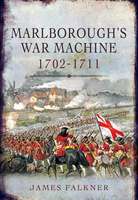A Talent for Adventure (ePub)
The Remarkable Wartime Exploits of Lt Col Pat Spooner MBE.
Imprint: Pen & Sword Military
File Size: 4.9 MB (.epub)
Pages: 256
ISBN: 9781781594001
Published: 10th May 2012
| Other formats available - Buy the Hardback and get the eBook for free! | Price |
|---|---|
| A Talent for Adventure Hardback Add to Basket | £19.99 |
Books on prison camps, daring escapes and life with the Resistance abound. Pat Spooner's story is different and more compelling in one important respect. It recounts the gripping and dramatic rescue of two senior British generals (one a VC) and an air vice marshal from occupied Italy by the author and his companion who had themselves both escaped from an Italian PoW camp.
This book covers a range of wartime exploits from operating behind Japanese lines in Burma and Malaya to laying secret dumps on remote islands in the Bay of Bengal for the benefit of RAF aircrew unable to reach their base.
At the war's end, Pat Spooner, a 25-year-old lieutenant colonel, commanded a war crimes investigation unit in Java and Burma. He describes his personal experiences of the intensive efforts to track down and bring to justice the perpetrators of some of the foulest crimes ever committed by Man. Then, as a senior staff officer (Assistant Adjutant General) he spent a further twelve months controlling the nerve centre, in Singapore, of the entire war crimes organization in Southeast Asia involving 18 investigation units.
As seen in the Surrey Advertiser.
Surrey Advertiser
A remarkable war, vividly described.
Military Historical Society
In his forward to this memoir, Sir John Chapple, notes that Tim Spooner 'packed in a lot during his War'. Whichever way you examine it, this is indeed true.
Society of Friends of the National Army
This is a genuinely enlightening memoir, told with a mild humour and self deprecation of tone which keep any hint of pomposity – an ever present threat in conventional autobiographies – well at bay. The author certainly believes in placing credit where credit is due, from Italians who helped him escape, to fellow officers and colleague investigators. A truly enjoyable read.
An adventurous and diverse set of military exploits" is how Field Marshal Sir John Chapple characterises this book in his Foreword. Commissioned as Second Lieutenant in 0ctober 1939, author Pat Spooner's exploits began when he went from Sandhurst to join the 8th Gurkha Rifles. His story takes in several campaigns. Diverted to Iraq, he narrowly escapes the Fall of Singapore and captivity in Japanese hands but is captured instead by crack German Panzer troops near Tobruk in June 1942 and transferred into Italian custody, first at Campo PG 21 in Chieti and then at PG 19 in Bologna. A unique and at times entertaining account of time spent as a "guest of Mussolini" follows, and it is interesting to contrast this with conditions in the POW camps run by other Axis powers during WWII. The reader then experiences all the high drama of the escape, and the episode in which Pat and friend urgently seek sanctuary at the great door to the Convent of San Giovanni with German troops heading in their direction down the street, just yards away, is a real cliffhanger and one worthy of an action movie. The two are later enlisted by British Intelligence to come to the aid of senior officers in 0ccupied territory and this sequence of events from 1943 is a story all of its own.
Stephanie A. Jefford
In early 1945, with the Japanese coming under heavy pressure in Burma, Pat, by then an 0perational Intelligence 0fficer, is sent on another mission, one devised by the RAF, and something of a "first." What happened when he went to the Andaman Islands is the subject of Chapter 6, 'Clandestine Catalinas', and covers ground seemingly neglected by the 0fficial histories.
0ne of the first British 0fficers to venture into the Dutch East Indies after Japan's surrender, Pat then becomes involved in a war crimes investigation team, serving in conditions akin to those on active service owing to the eruption of terrorist violence. The task of bringing Japanese war criminals would also take him to Burma and, ultimately, Singapore where as a senior staff officer he had responsibility for nearly 18 war crimes investigation teams. The author's descriptive and analytical account of these operations and the difficulties that had to be faced is comprehensive without being laboured, and makes absorbing reading. It also draws upon documentary evidence, including one source giving a rare glimpse of the doings of the British War Crimes Section in Japan, something generally overshadowed by attention given to the US 0ccupation Administration under MacArthur (see pp. 203-204). All of this should prove indispensable to future historians. It should also provide a useful corrective to the myth that the war crimes trials of that era were merely "victor's justice" or that they were concerned only with crimes committed against white European victims. A 'must-read' for anyone interested in WWII and its aftermath. Highly recommended.
Nestled in a leafy Guildford side street is the quiet home of a former M19 secret agent, who was fat tracked to military honours after his adventurous escapes, raids and rescue missions during the Second World War.
Surrey Advertiser
A grandfather now, and more than 70 years since the war broke out and Lieur-Col Spooner was captured in Tobruk, but the stories he has to tell are as gripping as any Hollywood blockbuster.
When you read Pat Spooner's wartime story you realise that most of us really don't understand the meaning of the word adventure.
WW2 Connection
A Sandhurst graduate whose first posting was with the 8th Ghurkha Rifles in India, Spooner was then sent to Iraq to protect the oil fields from the Germans. From there he was sent to North Africa and was taken prisoner by the Germans near Tobruk. He was sent to a POW camp in Italy where he stayed until the armistice. As he and his friend Jimmie Ferguson made their getaway they were given the task of getting two high ranking British officers back to safety.
Spooner's war continued in Burma and Malaya and ended up Investigating war crimes in Java and Burma. He then ran the war crimes commission in Singapore.
This is a well written book and one well worth reading if only to make one realise the lack of real adventure in their own life.
In a typically British manner, it would be nice to describe this book as a 'spiffing yarn' except it's all true in this case.







